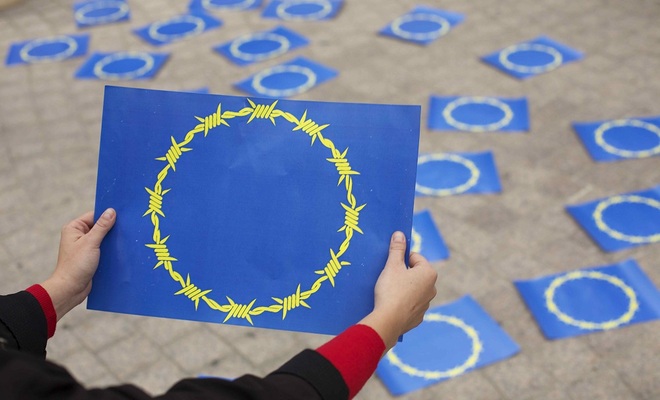The EU passed the „Self-Defence“ and failed the “Human Rights” Course

After yesterday’s EU summit on the refugee crisis, it is clear that the EU has adopted a short-sighted and restrictive strategy of defending and protecting its outer border between Turkey and Greece, far from its heart. The focus of the entire debate at the summit was on finding the most efficient model for deterring refugees from entering Europe, rather than finding a solution to the root causes driving their flight.
Similarly, our leaders failed to address the issue of ensuring the best possible protection for refugees within the EU over a prolonged period, and with solidarity when it comes to member-states obligations. There is no trace of a model pertaining to a balanced housing plan in all local communities across Europe, as suggested by Pope Francis. The focus on borders rather than people, apart from being immoral, is also politically short sighted.
The decisions reached at the summit indicate that Turkey is to become the new hot spot for the tidal wave of refugees (since none of the EU member states wishes that), without consideration of the long term consequences of the placement of a large number of refugees in only one country, incidentally the one that is bordering the war affected area. The Welcome Initiative believes that such a policy can easily lead to political destabilization in Turkey. At the same time, placing millions of refugees in refugee camps can in the mid-term lead exactly to what the EU fears – radicalism stemming from despair, hopelessness and poverty. The dependency on Turkey may entail even more benevolence on the part of the EU towards Turkey’s abuse of human and minority rights, industrial relations, and freedom of media. In terms of Realpolitik, Turkey is actually becoming the EU’s monopolistic supplier of the service it needs – the safety of its outer borders (which brings to mind EU’s dependency on Russian gas).
Europe’s shift towards a repressive defence-based solution and outright closure of its borders for refugees is also evident in the fact that border protection was allocated 600 million EUR as opposed to only a third of this amount - 200 million, reserved for the World Food Programme. Turkey will receive one billion EUR to develop and deploy resources that will ensure refugees remain within its borders. Europe has decided for an “out-of-sight out-of mind” model, no matter the cost.
The only positive outcome of this summit is the decision to additionally fund the UN agencies and all other EU-neighbouring countries which accept large numbers of refugees. The importance of co-operation with the UN in order to stop the war in Syria was mentioned, yet without the urgent call to declare an international humanitarian crisis. This can only be explained in terms of lack of political leadership capable of strategic thinking beyond a time-frame of several months.
Remembering our own position during the wars in Croatia and Bosnia-Herzegovina in the 1990s – what would we as citizens and you as politicians have said, had Austria, Germany and Italy pondered on how to close their borders to refugees and where to deploy armed forces, rather than how to deliver humanitarian aid to Sarajevo or Srebrenica, or how to integrate and ensure livelihood for refugees in their countries and how to stop the wars.
We wonder whether EU leaders will again have teary eyes over thousands of people drowning in the Mediterranean, despite the fact that their decisions of last night will force desperate people into the jaws of human traffickers yet again? This, in spite of its own founding Treaty on the European Union, whose article 5 states that one of the foundations of EU’s international relations is the protection of human, and especially children’s rights.
The Welcome Initiative stands firmly behind the position that a radical shift towards an international human security policy is not only possible, but imperative, entailing:
1. safe passage to and through EU territory;
2. a system of efficient reception and protection of refugees, using instruments of international law and a new model of integration, with the suspension of the Dublin Regulation;
3. political agreement at the level of the UN on an international humanitarian crisis, as well as undertaking political, military and development activities to stop the war in Syria and improve political and socio-economic conditions across Northern Africa.
Finally, we pose the question whether the EU forgot that the exam on international political accountability, apart from the self-defence course contains also the course on human rights, whose curriculum is defined by UN declarations and international obligations?
Photography: Luka Tomac



